|

September-blooming lycoris lily.
(*photo credit)
September 1, 2014 Anniversaries Sad and/or Glorious
It is nice to have the ability to recall anniversaries, but some can be bittersweet and some bring back joy and happiness. Much depends on what is celebrated. We appreciate recalling anniversaries -- something good and some significant historic events.
Second World War. Last month many recalled, but most likely did not celebrate, the centennial of the start of World War One in 1914. That was hardly a happy remembrance; today, a similar 75th anniversary strikes us, the official start of World War II triggered by Nazi Germany's invasion of Poland in 1939. The world was striving to come out of the Great Depression, and amid all the ordinary turmoil of life a massive force of armor struck across the lightly defended border of Poland from the west, to be followed by the Communist USSR invasion from the East a short time later. Entire European nations one by one became the victim of the Blitzkrieg.
Formal education commences. On this same fatal September Friday my mother took me to be enrolled in the first grade at St. Patrick's School, and for me it was as ill-fated as the invasion of Poland. That event of exactly 75 years ago was the start of three decades of education, all of which had meaning but for the most part regarded more as duty than total pleasure. I always preferred to learn on my own, but that required a special discipline. Certainly that first year was the hardest, and had the time and resources existed, I would have opted for home schooling. I liked geography and attained map skills and facts by reading on my own, and especially by following the war from 1941 on.
Entry into the Society. On that sunny September 1, 1956 I said goodby to younger siblings and drove with my parents an hour away to the Milford Novitiate on the Ohio side of the River. Before formal mustering in, four of us new "novices" decided that since we had to turn in our valuables (watches and money), we might as well have a poker game, whereupon I lost all the money I had left in this world. The lucky winner, Hank Wehman, had a scruple for taking the total life's loot of three others and reported it to our Novice director, Father Wernert, who greeted the revelation with shock and anguish, realizing that this class was going to be a difficult one. Times were changin,' and it was the final days of Pius XII's reign. We made our first thirty-day retreat according to Jesuit tradition. It was a news blackout, but open autumn windows allowed the radio of bricklayers building the chapel next door to keep us abreast of 1956 World Series play. And then at that time the Suez Crisis and the Hungarian Revolt occurred, which we mistakenly thought were caused by our prayers. Innocent and happy days are again recalled this weekend by the thinned ranks of those who wish to recall the 58th anniversary of that entry date. Those gathered this weekend will be slower, grayer, but hopefully wiser -- all celebrating a distant event.
Prayer: Lord, fashion us to see life's journey as preparation for a grand homecoming in which you are the principal celebrant.
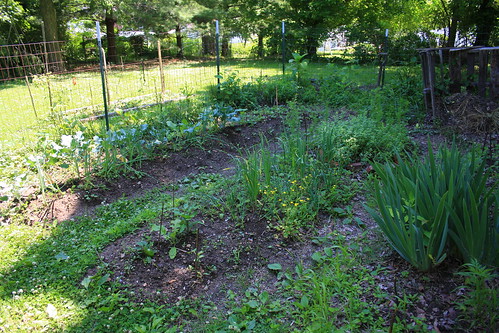
Prosperous garden of Fr. Al Fritsch. Ravenna, KY.
(*photo credit)
September 2, 2014 Sow Autumn Greens in Summer Glory
This is prime seed sowing time, or perhaps the last chance to have a productive fall garden. Actually, sowing earlier could have been a disappointment, dependent on variable weather conditions. Even when sprouted, hot weather will wither the small plants without constant watering. With a milder September and plentiful moisture, a number of the greens will most likely furnish us with salads until at least the end of the year (though we will need late fall cold frames or other forms of plant protection).
In my youth on the farm, we always sowed kale and mustard as the late crops, and Mama even sold bushels of fall produce at the local grocery. Both of these greens are extremely nutritious, and the mustard has that autumn tangy sharpness awakening us to the season. We also grew endive, a good crop passed down from French ancestry, for the French champion autumn greens. With proper care and harvested when just tender enough, that plant can make a gourmet salad with vinegar, oil, onions, cherry tomatoes, and seasonal herbs. Turnips are of course an autumn staple for rural Appalachians, and these do very well either planted thick for greens or in rows for the purple root. Don't forget about growing Swiss chard in a number of varieties, for this can be easily transplanted into greenhouses and can grow well into late autumn. Radishes, and especially Japanese radishes, do very well in autumn when the conditions are right -- and radish tops can be used for greens either fresh or cooked; the radishes will not go immediately to seed as some varieties do in our Kentucky late hot springs. In fact, with care one can also grow such spring favorites as leaf or bibb lettuce and spinach.
Taking a cue from the poor folks in the deeper South, we find that collards can be raised just like kale and endive and can withstand the winters in our parts with a minimum of protection. Most vegetables need to be protected from wind burn as much as from sub-freezing temperatures. Other members of the autumn Brassica family include cabbage, Brussels sprouts, broccoli and cauliflower, though starting these from seedlings grown elsewhere may be required due to a shortened growing season. In autumn the brassicas are not as prone to bugs and worms due to the lower temperature and insect cycle. Try kohlrabi also, for this autumn plant will not go quickly to flower and seed; both bulbs and leaves can be eaten fresh or cooked.
Different European and Asian greens can also be favorites during the autumn season. Arugula rocket (a wonderful nutty and tangy-tasting leaf green) does very well in the mild-fall season. Autumn may be the best season for those gourmet "mesclum" salad mixes of greens and herbs (especially dill) -- but they take 45 days to mature -- and northern folks may not have that many frost-free days. Beets and onions furnish greenery for autumn meals, as do an entire variety of fresh herbs. May the weather cooperate and crops flourish.
Prayer: Lord, help us to act when that is needed so that what is to follow will be to your glory and our satisfaction.
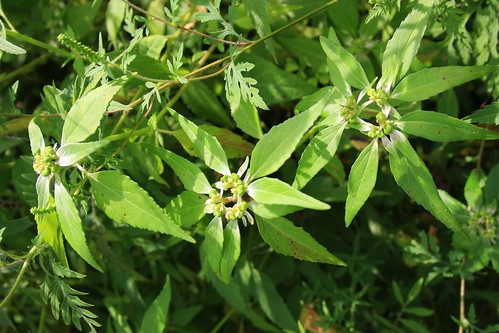
Field of spurge, Washington Co., KY.
(*photo credit)
September 3, 2014 Travel Versus Glorious Electronic Communication
My crusade to reduce travel by vehicle and increase communication as an energy efficiency measure has only limited success. It is built on the inability of underlings to have any influence on leaders who compulsively believe that if people meet more often, the work will be more efficiently performed; and this is not necessarily true. Meetings kill time and can be a way of pretending that success occurs when it is pure talk. When the artist who painted the "Declaration of Independence" showed it to John Adams, the ex-president laughed and said it was simply not the way it happened, for there were never more than a small number assembled at a given time. The group never had full attendance at one time.
I am not denigrating the value of face-to-face contact, only that this compulsion for meetings is the only pathway to success. Meeting in an age of electronics by teleconferencing can save time and energy resources, plus it may be cheaper in the long run.
Natural resource costs should be primary in an age of climate change. Trips to meetings can be elitist, addictive, impulsive, and forgetful of resource costs. Recall that one airline trip across the U.S. takes more non-renewable fuel than what is spent on space heating/cooling and domestic energy use for an average world family in the entire year. More airline trips are being made this summer than in any previous period -- hundreds of millions, at a time when we were hoping that carbon dioxide expenditure would be reduced.
Financial cost savings are a prime concern of members of the lower or middle class. Yes, it takes funds to travel and most people do not have the resources to do so -- only a growing upper class with private jets and special airline passes. The final bill after parking and fuel to and from the airport can hurt. We travel now far less frequently than those with financial means, and the more able-bodied compensate through hiking and biking. Using private or public means may be additional travel options, but the cost of making contact by electronic media is far less than to set out and travel by any modern means. Frequent fossil-fueled trips damage our Earth.
Time costs drive some of us to more frequent communication. It certainly took time to go to the Continental Congress (a week or so from Boston to Philadelphia in 1776), and plenty of effort bedsides. Such journeys were far more challenging than today's worrisome trips to and from the airport, waiting time, occasional delays, landing and getting to place of destination, and final recovery from trip. Electronic communications take up only a fraction of that time, and the person is better suited for the next operation. I know there is social value in coming together, but this is somewhat compensated by some face-to-face meeting at a far less frequent rate over the years.
Prayer: Lord, teach us to use our limited resources very well and to continue to communicate frequently with you and others.

The common dandelion, Taraxacum officinale.
(*photo credit)
September 4, 2014 Honoring the Glory of a Living Wage
The week of Labor Day is a perfect time to recall that many workers seek benefits for work performed and yet are hindered in many ways. We learn how fast food workers are attempting to organize at this time as well as Walmart and other Big Box employees. Resistance comes from commercial and corporate groups and especially through the overhanging threat of job loss by potential union members. With minimum wages at an outmoded $7.25 an hour it is time to follow a few enlightened states and President Obama's lead (for all Federal projects) to raise the minimum rate to $10.15 an hour.
Labor unions' total membership has been hurting in recent decades through plant closings due to jobs going overseas and to automation. Organizing workers is no easy matter, as some who are trying to organize today will readily testify. A number of heroic groups with social justice and church affiliations are trying to assist, such as the National Interfaith Committee for Worker Justice (NICWJ). Work has value since God worked to create the world in which we live. We honor God by ensuring that laborers, particularly low-wage workers, are able to live decent lives as a product of their labor. The NICWJ calls upon our religious values to educate, organize, and mobilize the U.S. religious community through campaigns to improve wages, benefits, and working conditions for workers.
Among the basic rights of the human person must be counted the right of freely founding labor unions. These unions should be truly able to represent the workers and to contribute to the proper arrangement of economic life. Another such right is that of taking part freely in the activity of these unions without risk of reprisal. Reference: Pastoral Constitution of the Church in the Modern World, Second Vatican Council, 1965.
We support the right of public and private employees and employers to organize for collective bargaining into unions and the groups of their own choosing. Further, we support the right of both parties to protection in so doing, and their responsibility to bargain in good faith within the framework of the public interest.
Reference: Paragraph 73B Collective Bargaining, Social Principle of the United Methodist Church.
Jewish leaders, along with our Catholic and Protestant counterparts have always supported the labor movement and the rights of employees to form unions for the purpose of engaging in collective bargaining and attaining fairness in the workplace. We believe that permanent replacement of striking workers upsets the balance of power needed for collective bargaining, destroys the dignity of working people, and undermines the democratic values of this nation. Reference: Preamble to the Workplace Fairness Resolution, the 104th Annual Convention of the Central Conference of American Rabbis, 1993.
Prayer: Lord, inspire us to help support and organize low-wage workers to obtain living wages for the work they perform. Help us to see unfairness and to work for the betterment of all.

Spring blossoms of wild peach tree.
(*photo credit)
September 5, 2014 Peaches Have Their Glory Days
Mid-summer is peach season, but those of us who consider this the fruit of summer like to extend its season from July through September. Peach cultivation has had a long history. This fruit was domesticated in China about 4,000 years ago (the oldest cultivated Chinese fruit), and a number of wild varieties are still found there. The domesticated fruit moved gradually throughout the world, reaching the Middle East and then Rome by 65 B.C. The Spanish brought the fruit to America soon after Columbus, and it has been grown in warm areas of the American South ever since. In some way, Americans, especially from Georgia, South Carolina and California, regard the peach as a naturalized citizen and truly belonging in America.
Hardly any other fruit has such versatility for culinary delights, beyond the wonderful experience of eating them with all the juice running down upon the beard -- Scripturally speaking. Peaches have good color and flavor retention as well as firmness for cooking and baking. Among processing possibilities one can list peach: ice cream, turn-overs, salad mixes, canned halves, candies, cereal topping, yogurt, brandy, upside down cake, and on and on. In America, peaches are picked when ripened and then canned within hours in order to retain flavor.
Why do I remember so many ways to eat peaches? In part it is because my uncle Bud persuaded his dad, my maternal Grandfather, to plant a thousand trees on a portion of the farm. This orchard had only one good year -- for peaches can be temperamental and in Kentucky are highly dependent on the date of the last frosts. That good occurrence was in the middle of the Second World War (1943), yet it was a great memory. The ripe fruit broke down branches. Pickers were in short supply, and my dad spent a weekend assisting. The gathering barn was overflowing -- with peaches and excited volunteers, and the local town folks were delighted with the unexpected bounty. It was like a flash in the pan because lack of refrigeration made much of the crop's largesse short-lived. Peaches have a brief duration between ripening and spoilage, and so that was a once only welcome cornucopia during gas-rationed food shortages.
What makes a good tree-ripened peach taste so exquisite? We seldom find similar flavor in store-bought fruit, since peaches have to be picked when half green in order to endure the shipment and normal sales periods before being consumed. Is it because most of us do not have the luxury of getting our fruit by going out and picking them off trees -- and this applies more to peaches than to apples, bananas and citrus fruit, which can be shipped more easily? The capture of the sun's rays in the fuzzy peach skin is beyond description -- and that is all the more reason to grow peaches in our own backyard. Truly for much seasonal produce, the time between picking and enjoying fresh items should be reduced to the least possible. That applies to fresh corn, tomatoes, cucumbers, most berries, plums -- but especially to peaches.
Prayer: Lord, teach us to enjoy each day for what it brings.

Castor bean tree with fruit.
(*Photo by S. Slater, Creative Commons)
September 6, 2014 Respect the Glorious Castor Bean Plant
Then Yhwh arranged that a castor-oil plant should grow up over Jonah to give shade for his head and soothe his ill-humour; Jonah was delighted with the plant. (Jonah 4:6)
Of all plants, I regard the castor bean (or "mole bean") plant as one of the most beautiful in our world. Europeans recognized this by using this decorative plant in flowerbeds and gardens as a combined ornamental and as protection from varmints. However, in a return European visit last September I noted fewer in gardens and public town squares. Truly, we all seem to be showing more respect for this tempting but highly toxic plant and its beans. God created beautiful plants and touched the dispirited Jonah for a little while with the shade of the castor bean plant. The plant does grow quickly to a grand stature --and then dies back in our temperate zones with frost and winter. In less than three months it can reach a height of twelve feet, with a reddish or purplish stem and green umbrella leaves that can grow to more than two feet across. The cluster of flowers, which can be removed due to the toxic nature of the seeds, yields a fruit during this short growing season.
A word of caution. The mole bean is regarded by many as one of the most poisonous naturally occurring substances known to people, animals and insects. While all parts are somewhat toxic, it is the broken seeds, which come in clusters on the mature plant that should be kept away from animal feed or children, for they contain the deadly poison ricin (Ricinus communis). The 1997 Chemical Weapons Convention listed ricin as a Schedule 1 Controlled Substance. To swallow whole is not strictly dangerous, but to chew is fatal to most living members of the animal kingdom. I ceased growing the mole bean when a fellow Santa Clara chemist chastised me for having it in our demonstration center at ASPI. Visiting children could be tempted to pluck and eat the ripening berries and be dead in an hour or so.
This is genuinely a challenging plant, for the castor bean plant is highly beneficial for keeping away moles and other varmints. But make sure the plant is kept out of reach of children, pets, and livestock. The plant is more than a beautiful plant; it can be a natural pesticide. When properly extracted, the castor oil is also used as a medicine (a purgative, which was the only substance I really despised as a youth). The oil is also used as a very fine lubricating oil and for other specialized applications.
All of nature is ultimately good provided we respect it and use it properly. And respect includes respect for how used. So much rests on our use and appreciation of the beauty of even toxic substances and the respect we show dangerous materials. Recall that tomatoes have toxic parts. Each plant is good in itself, but we must know the limits of the good. Only then can our praises involve the cautious human embrace.
Prayer: Lord, help us treat your creation with deepest respect
and to use Castor bean and other plants with proper caution.

Miami mist, Phacelia purshii.
(*photo credit)
September 7, 2014 The Glory of Successful Fraternal Correction
If your brother or sister listens to you, you have won them over. (Matthew 18:15)
Taking corrective measures is part of our collective journey in faith. Some must speak when misdeeds are evident; those spoken to who are sincere will accept the corrective measures and learn from them. There is glory in such a success, but that is not always the case. In our age, wrongful acts of polluting the environment or wasting resources require corrective measures, either at an individual (one to one) or small group level. Such more personal corrective measures done in private trigger the least embarrassment or social disruption. When these corrective measures fail, wrongdoing should be brought to the "church," or larger community. We cannot remain silent; we must show objection when wrongdoing occurs. All in all, Earthhealing involves fraternal correction.
Such corrective measures require people to interact in a frank and honest manner, either one-on-one, small group interaction, or larger and greater public action. In this age of social media and communications revolution, a first step is to notice and observe the wrongdoing; the second is to have the courage to bring this to the attention of the wrongdoer; the third and most problematic step is the successful connection and resulting corrective measures. We live in an age of instant communication -- phones, e-mail, radio, television, all of which can help us in public interest activism. It may not be easy to pinpoint blame to the proper person or agency; and it is certainly harder to bring about the corrective measures.
Today, with the serious environmental crisis facing us, it is important that we learn to see dangers and join support groups to expose wrongdoing, so that solutions can occur on a sound basis. We cannot remain silent when we know about wrongdoing in our midst -- and yet we most often cannot effect corrective measures alone and feel our powerlessness as agents of change. Driven by a sense of responsibility we want to take effective action, and that means contacting others as to how to proceed in difficult cases. Decide to network, use every letter you write, every conversation you have, every meeting you attend, to express your fundamental beliefs and dreams. Robert Muller.
The Internet and social media allows for one added benefit when the agency or individual refuses to listen. We can have recourse to a broader media of concern, often a powerful tool for awareness and courageous backing by like-minded persons desiring corrective action. At very little expense we are able to converse with distant confreres and help bring about fraternal correction together with their support. Through accessible Internet search engines we find groups and individuals who have similar concerns and can help catalyze joint and effective solutions. Together, global correction is possible.
Prayer: Give us, Lord, the courage to act when misdeeds occur,
and to do so in a merciful and all-inclusive manner.

Hazy, late-summer stroll along Kentucky creek.
(*photo credit)
September 8, 2014 We Seek to Glory in Clean Water for All
All people have a right to potable water. Yet some find the public drinking water scarce or suspect and turn to commercial water, which may or may not be better quality and comes in a plastic container using fossil fuel resources. The truth comes home: water is being privatized. What is inconvenient for some with money in their pockets is a major difficulty for poor folks, both urban slum dwellers (over half the world is urbanized) and rural small-time farmers seeking potable water as well as lower quality water for irrigation and livestock.
We face a global water crisis as glaciers (source of water for many in Asia) shrink, majestic rivers reduce to a trickle before they reach the ocean (e.g., Indus, Colorado, and Rio Grande), and public swimming places declared off limits during this summer month. Even the holy Jordan of biblical fame often reaches the Dead Sea only as a brackish streamlet. Accessible fresh water is now regarded as a valuable commodity by profiteers and the adage "Water, water everywhere but not a drop to drink" is becoming ever truer with each year. Mexico City, with its twenty some million inhabitants and growing at one thousand people a day, is beset by subsidence due to pumping out water from below its basin. Many of these global mega-cities are starting to experience major potable water problems.
Funds are in short supply for water distribution infrastructure, and so city, state, and national governments involved turn increasingly to private funding sources. But is privatization the answer? American cities are not alone in fighting this battle; so do numbers of large and small communities throughout the world. Some say privatization can only succeed with political and financial support. What does that mean? London's International Policy Network, which has promoted water privatization, admitted that the practice does not have a perfect record, as is the case with a variety of other popular privatization schemes from parking meters to prisons. In part, the comparison only contrasts this approach with some public systems that have not tackled the water problems in their areas. The solution is not privatization, but citizen involvement in solving major water quality and quantity problems, of which the global public sector needs improvement and constant vigilance.
Cities such as Recife, Brazil and Bogota, Columbia received World Bank loans for public service expansion -- something unheard of at the turn of the century because of the bias in favor of private utility services. The push for private water development from Latin America to sub-Saharan Africa depends on individuals pushing their own profits. But we return: water is an essential right of all and beyond profit-making calculations. The 21st century must reclaim the commons and that means sufficient drinking, cooking, and bathing water. Climate change exacerbates the problem; those concerned about thirsty global neighbors seek available and affordable solutions.
Prayer: Lord, allow us to see the need to give water to the thirsty as a step to healing our troubled Earth.
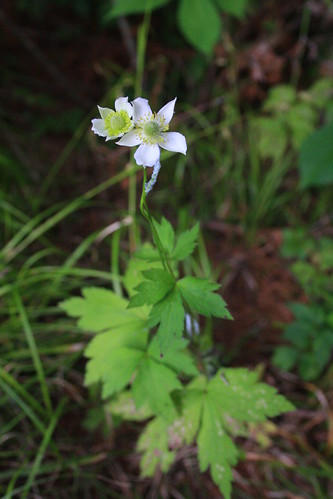
Thimbleweed, Anemone cylindrica, central Kentucky prairie edge.
(*photo credit)
September 9, 2014 Public Lands Glorify the Commons
Today, battles rage among red-state conservatives and blue-state liberals over the role of public versus private portions of our lives. Certainly air and water have a better claim as commons than does land -- or is that accurate? We divide the surface of our planet into those public areas called "commons" and include the seas (four fifths of Earth's surface), frigid Polar regions and about one-quarter of ours and other countries' national, state, county and city parks plus wilderness areas, forest lands, military bases, airfields, prisons, highways, cemeteries, historic monuments, public educational and technical institutions, courthouses and other public buildings and land -- a vast land-related treasure.
Does this listing show my bias for public lands, or an effort to hold back the forces of privatization from taking over prisons, roads, health and educational facilities, and water works? How this improves the situation is then explained by a form of propaganda that deliberately denigrates public service and management, with little mention of greed, control, and profit. Rather, they intend to repeat the mantra that private domains are better. Some of this public interest bias on our part touches on partisan politics and brings about an opposition to extreme libertarianism. But looked at another way, public land defense should be always non-partisan in use and preservation for future generations. Public lands deserve attention:
Public lands as tempting -- All public lands are threatened by the efforts of developers and other interests to take control. Through lobbying efforts and proper influence, determined individuals may tempt lawmakers to introduce measures allowing them to take over public lands as though they can manage them better. Far less focus is placed on protecting silent land from unjust aggressors.
Public lands as fragile -- The wildfire season, which seems to grow more serious each year, makes us aware that public lands can be damaged in part due to the openness that makes them more at risk. Thus, ongoing preservation, especially at times of climate change, requires police and fire protection for public areas.
Public lands as valuable to all -- The use of seashores by small numbers of private parties who exclude multitudes and force them to share ever more congested areas is part of our country's avoidance of the common good, and deference to the private privileged. Open public seashores warrant proper management.
Public lands as future resource -- We must fight privatization of what we all hold as a common heritage that has much intrinsic value beyond economic development. It's difficult to work for things that we will not live to share benefits of, and public lands are our investment for future generations.
Prayer: Lord, give us a deep desire to share all the commons, from air and water to the land itself, and to defend public lands against all privatization assaults.
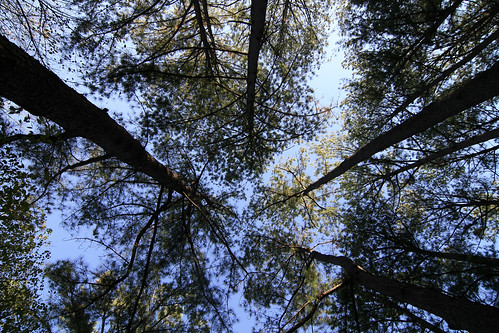
Grove of pines. Tunnel Ridge Road, Red River Gorge.
(*photo credit)
September 10, 2014 Endangered Trees: Threatened Forest Glory
When I wrote the first draft of this it was right after the surrounding forest trees were leafed out this year. The return of green foliage makes us think that all is healthy in our Appalachian hills, but is that the case? More people are aware that the phrase "Endangered species" applies to the animal kingdom, where 25% of mammals and 11% of birds are endangered. But the plant kingdom is equally threatened. Recall the story of the American chestnut, a predominant tree of our forests destroyed by blight; however, efforts are being made to bring this tree back from near extinction.
In a 1998 report of the World Conservation Union in Geneva, Switzerland, an estimated 8,600 species, mainly in tropical, areas were listed as threatened species. The current count has grown and currently 9,500 trees have been assessed as globally threatened, with 1,100 of these classified as critically endangered. It is noted by world conservation groups that not all plant species are accounted for, and so dangers may still lurk that have not been reported. The estimate is that 10% of all tree species are threatened globally and that includes a number in the United States. It is insufficient to approach this only on a species-by-species basis even though tempted to do so, because of the many threats now posed to popular species around and about (e.g., the American hemlock, American elm, Fraser fir, red and white oak). Threats come from invasive species or from native pests when trees have weakened immune systems due to air pollution. Fires raging in the drought-stricken West this year are most intense.
Trees are in greater danger because of misguided human practices; this occurs through the cutting down of forests for highly desired timber and also for grazing, cropland, roads, houses, mines and a host of other things. Development is the main culprit within tropical countries having the most to lose -- and especially through rapid deforestation in Africa, Asia and the Amazon. Since the turn of the century an estimated one million square miles (of an estimated thirteen million) of forest lands have been cut. In some cases the forests have been cut over and high graded for certain species and then allowed to regrow, but this occurs after the rich biodiversity of the original land has been damaged. In more cases the landscape, after logging, takes on the eerie glare of a moonscape.
Some efforts to reserve wilderness areas and make them off- limits to development are now afoot in many countries of Africa, as well as in Brazil and some Southeast Asian nations, but they may not save every species under threat. Some of these reserves exist at the mercy of existing governments, which could change over time and with political fortunes. Rampant development is a threat to tree lovers who regard threats to any species as personal. We must support the valiant efforts of conservationists to identify endangered species and to preserve or restore them in their native habitats.
Prayer: Lord, teach us respect so that we see trees as treasures and help us join forces with those preserving our threatened forests.

Garden in the rain with mayapple, Podophyllum peltatum.
(*photo credit)
September 11, 2014 Burial Grounds: Sic Transit Gloria Mundi
Graveyards are where noble people await the herald's trumpet. Tombstones reveal abbreviated messages as does the degree of cemetery upkeep or neglect. Seeing desecration first hand a decade ago left a deep mark, as did seeing a neglected graveyard on the farm that was the birthplace of my mom, which I visited as a youth.
A Graveyard's Tale
Becky Simpson invites us to a Harlan County spot
to film her father's forebears' burial plot;
Logging dozers overshot the legal 300-foot line.
If we bring a four-wheel drive we'll do fine,
for that uphill roadway is mighty rough,
and to slip off makes rescue pretty tough.
We pass the finest hemlock, oak, hickory stand
in this untouched part of Cranks Creek land.
We pause where her grandma's homestead stood
at a rippling crickside where water's good.
Yes, we smell cherry pie and feel warm hugs,
but nothing's left, only woods and birds and slugs.
We walk woefully the last mile by design,
as we scan ahead to the Virginia/Kentucky line --
Dozer power -- push through anyone's right-of-way,
who's too poor to prove or pay a land survey.
You'd think 18th /19th century tombstones
stand utterly silent, but we swear each moans.
We film Becky walking and talking with grandson Chris
about uncle and aunt, mister and miss.
Some died in childbirth, others outlived the flock,
a story of pioneer stock, tough as rock;
But over the bluff comes another shock,
beyond a tree screen, a massive choppers' block.
Something catches my eye. Where the north edge flows
the headstones are lined in partial rows.
Chris stirs leaves and thatch from the fresh bulldoze
and finds pieces of marble. You can suppose
with the plain tombstone writing that the story grows --
markers splattered, scattered, shattered repose.
Becky's too mad to cry, but her jaw and chaw give,
"Chris, don't forget this as long as you live."
Even our team allows them a little space,
and so we stroll off to see the timbered place.
We look out over to mother Virginia's green landscape;
its upslope's clear-cut writes a tale of rape.
The whole trip is sort of like a retreat
as we slip back downhill there're questions replete:
If the old order passes away, what will the new be?
Do we hear one dragging a tree to Calvary cry
"If they do it to green wood, what happens when it's dry?"
Can we turn forests back to "commons" before we die?
Prayer: Lord, teach us respect for final resting places.

Bison at Land Between the Lakes, KY.
(*Photo by W. Stera, Creative Commons)
September 12, 2014 American Bison: The Ancient Glory of the Plains
I grew up in the Buffalo Trace area of Kentucky, named because the American bison (misnamed "buffalo") would migrate from parts of the Midwest plains to the salt springs at nearby Blue Licks. In their annual trek they followed the leader and created a trace or trail that is the present U.S. Route 68, known to political scientists by President Andrew Jackson's vetoing the "Maysville Road Bill." These majestic bisons, the largest current mammals in North America, would cross the Ohio fords at low tide and then return afterwards, replenished with salt supplies. My travel agent told me once that I squeezed my budget so hard she could hear the buffalo bellow (a bison image on nickels or five-cent pieces from 1913-38).
The bison was part of early American history but somewhat remote except in paintings, movies, coins and an infrequent Yellowstone trip. Upon getting acquainted, bison are social beings if left undisturbed; the mixed adult male/female herds raise their young with care. For centuries bison were companions and mainstays of life for Great Plains Native Americans, furnishing food and hides for clothes and lodging. Bison numbers dwindled to a fraction after the 1800's massacres, which were encouraged to make profits, clear railroad tracks, and destroy the livelihood of resisting Natives. One hunter was known to have killed 20,000 bison during the 1870s. By 1890 the 60 to 100 million American bison that Lewis and Clark observed at the start of the century -- as a brown sea of motion on the plains -- dwindled to a mere 750 animals.
Through conservation measures and protection, the American bison has made a comeback from less than a thousand in 1900 to number 340,000 in North America, though only about 12,000 to 15,000 are of pure stock; the rest are mixed with domestic cattle genes and exist in a semi-domesticated state as meat-furnishing livestock for the product is prized for low fat content. We say "semi-" about their current state because as long as they are fed, watered, salted, and have good companionship they do not mind farm and ranch conditions; they won't move about if they don't have to. However, isolate them or make them discontented, and virtually no fence will contain these bulldozer-like beasts weighing one to two thousand pounds as adult males and 800 to 1,000 pounds as adult females.
In recent years we regained the glory of the Plains through renewed pride in American bisons. They are not the most friendly animals (four times more people have died at Yellowstone from bisons than from bears), and are really quite speedy and vicious when provoked. They have all the regular bovine characteristics of resting, eating, and chewing their cud. Their shaggy coats allow them to withstand harsh weather better than the more domesticated cattle, with which we are familiar. If popularity continues, we will hear more about bison burgers. Some descendants of settlers who came to raise cattle are not enthusiastic about restoring the underpopulated Great Plains by bison, but it is good ecology.
Prayer: Lord, help us return wildlands to their former glory.
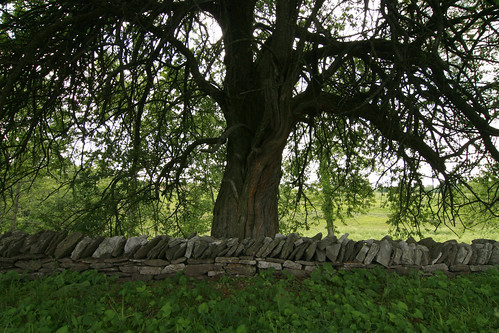
Stone fence at Shakertown of Pleasant Hill, KY.
(*photo credit)
September 13, 2014 Is Population Decline Problematic or Glorious?
The rate of population growth continues a steady decline to about +1% annual increase from +1.8% per year a decade ago (still 70,000,000 more people in 2014). While the world grows in population, still the declining rate means many new mouths. Amid unpredictable estimates due to the collective individual choices of billions comes the fact there will be a billion more mouths by the mid century. Sometime in the past few years the focus of attention shifted from overpopulation problems, especially in underdeveloped regions (still a problem), to the lack of population growth in developed countries in Europe and the Pacific Rim. For a time Russia lost a half million people per year but making it up in part through immigration from former USSR republics. Slavic nations have experiencing losses, as well especially where people are moving to Western European countries with population growth from people coming from Africa and the Middle East (over ten thousand a month).
Today, using the most recent United Nations statistics of birth rates and death rates some 20 mainly European nations (plus some small islands like St. Helena as well as the Holy See) have higher number of deaths than births. These are Austria, Belarus, Bosnia, Bulgaria, Croatia, Estonia, Germany, Greece, Hungary, Italy, Japan, Latvia, Lesotho, Lithuania, Republic of Moldavia, Portugal, Romania, Russia, Serbia, and Ukraine, with the heaviest actual loss in the Ukraine. If one considers emigration totals, Moldavia will have one of the highest losses (almost 1%.per year). Also, some slow-growing populations such as Puerto Rico are due to losses of population through emigration. The twenty losing ones listed above only account for about 8% of the world's population, with some of the remaining showing higher population growth of 2% or more per year.
Aging populations can be problematic: the shortage of workers to pay into the social structures needed by a graying population with growing health problems; decline cannot be easily reversed by the residents; fears of changing the ethnic composition of a community can lead to xenophobic behavior; and an atmosphere of aged people can depress societies and lessen the freshness of creative ideas from a strong contingent of youth. In a nut shell, the heart of the problem is that the momentum of decline could in some places become so great that policy changes will not be effective unless more middle-aged have children, and that is highly unlikely in our modern age.
Depopulating nations face the growing burden of health care, increased pensions payments, and debt servicing; this will fall on fewer and fewer workers as the decades progress. These worries are also surfacing in the United States, which thanks to net immigration is not expecting any decline in population in the foreseeable future. China's drastic one-child-per-family policy is a major contribution. Whether other nations will take drastic steps to curb or enhance population growth is an open question.
Prayer: Lord, inspire all nations to develop proper policies to attain population stability for the good of all citizens.

Passiflora incarnata, Kentucky native wildflower of roadside and waste places.
(*photo credit)
September 14, 2014 Road Signs and Crosses of Glory
The Feast of the Holy Cross speaks to us in different ways. For those of us who believe in Christ, this cross is a moment of glory, for on this despised instrument of death our Savior died. For others who are non-believers the lack of glory is foremost. So the sign of the Cross is truly countercultural. Some are embarrassed or angered at this public act, whether in prayers or in ornaments worn or displayed, or mention or public expression of our belief in Christ.
Publicly worn crosses, whether crucifixes or plain crosses, are often objected to by secular society. Some businesses even notify workers not to wear crosses openly. In fact, at one time I heard in prisons I was servicing that prisoners were told to refrain from wearing crosses in any form. I advised them to wear what they believe but hoped they would not get into trouble. The issue lapsed with time. The cross can be a public sign of faith as found in many roadside shrines in Europe and in traditional Catholic parts of the world. Some of these are being removed, for the display "offends" a secular public even more than that being places of popular devotion. How about showing what we believe through signs we wear and respect?
Signs of crosses were prominent in former times when basketball players were ready to shoot a foul shot; whether that was good luck or piety was a matter of debate. We noted on TV that the late Venezuelan President Chavez made the sign of the Cross at his speech at the United Nations a few years back. Many will bless themselves before a meal in public and that is often a welcome sign that our food is truly a gift from God. Teach each youngster to make that sign and to do so bravely and with courage in a world that is really striving for secularity. None of us should fear making that sign when we feel so inclined -- feel free to do so.
Public Road signs include little white crosses with artificial flowers and attached names at bridge abutments and sharp curves where a relative or friend met death. Once a secular group tried to get crosses beside public highways removed. Our Kentucky Secretary of Transportation retorted that if they assist drivers to be more cautious, they should be continued. All drivers deserve moments of caution, and signs indicate icy bridges, deer crossings, high water, or road construction ahead. Some tell us distance, road designation, and upcoming junctions. Even with GPS devices we still need road signs that are cautionary and informational. People whose names are on crosses had good times and thought they would live forever. Then it suddenly happens -- a whirling about, a funny sense of being out of control, sharp pains, blackouts, perhaps a final word that may be unmentionable; horrified passersby, hesitancy to act, fumbling to call 911, and sirens; later, a funeral with kind words, an unopened casket, and a graveside cross to remind us to be respectful.
Prayer: Lord, give us the courage to continue to display the cross of our salvation as a sign of courage, public devotion, caution, and glory.

Autumn sneezeweed, Helenium autumnale. Madison Co., KY.
(*photo credit)
September 15, 2014 Appalachian Energy Policy and Return to Glory
Our Appalachian region has been a provider of fossil fuels (coal and to a lesser degree natural gas and petroleum) for over a hundred and fifty years. These extractive practices leave an environmental mark on portions of this region. The four proposals that follow are not new, but presented by our environmental community for decades:
Promote local renewable energy sources that are not damaging to the environment. These include such applications as solar, wind, and geothermal, as well as hydropower, especially micro-hydropower sources. Some wood is tolerated; so are non-renewable fuels as interim fuels, but every effort must be made to reduce their use and to phase them out ASAP in the light of advancing climate change damaging effects (carbon dioxide is now past 400 part s per million). Solar and forms of geothermal energy are available throughout the region and wind has advantages in higher elevations.
Champion energy conservation measures. Energy efficiency is the order of the day both for this region and for the entire nation and world. Implementing this policy requires energy conservation practices that in part can be augmented by a carbon tax (or fee), depending on how proposed or implemented. Lighting can render greater savings along with insulation and use of efficient electric appliances and even wood stoves, all of which are commercially available. Utilities can serve as promoters of energy efficiency through rate adjustments to penalize energy wasting and through subsidizing energy efficient lighting fixtures.
Phase out coal-fired power plants. Many of these coal facilities are reaching the end of their life span and will have to be updated to meet advancing pollution standards or just closed down. With greater fuel efficiency, the need for coal as a fuel source decreases with time and an orderly phase-out would be less harmful to the retracting coal industry in these parts. Forget storage of carbon dioxide as an air pollution measure, for this is quite expensive and most likely not feasible in the current climate. It is far better to move to alternative money making tourist attractions and retirement community servicing.
Be attentive to energy and labor needs. Ultimately, use of renewable energy sources will gain popularity in fossil fuel dependent regions. An active reclamation program will both beautify the region and allow for areas of work in job-short portions of the region. In fact, conversion to renewables will be an equal or greater source of jobs and a way of holding down fuel costs. But with spiraling heating and cooling costs, some low income people need to have subsidies to tide them through the coldest and hottest seasons of the year. Workers depending on cars to get to work are stuck with high gasoline prices for their older inefficient vehicles.
Prayer: Lord, allow us to prepare for our future when the beauty of the past will be restored in the spirit of renewal and the region
can support people without depending on resource extractive work.

Time for Kentucky's harvest moon.
(*photo credit)
September 16, 2014 Mayflower Day: Ethnic Pride and False Glory
With the fading of the American Dream, we ask whether social privilege is becoming ever more exclusive. Mayflower Day celebrates the arrival of early pilgrim ships bringing people to our shores to escape English persecution. On this date in 1620, 101 colonists and ship's crew set sail from England on the ship Mayflower for a new home. These were welcomed by the Native Americans who, back in time, were descendants of immigrants as well. We are a land of immigrants -- and thus people of a community, not a social class.
We may know some folks who take great pride in being descendants of the pilgrims who came over on the Mayflower. So be it! All ethnic groups should take pride in their ancestry, not just the Anglo-Saxons or the earlier arrivals. While not a member of this illustrious Mayflower heritage, I admire these and all people who document their family history and find reasons to respect those who braved the oceans to come before them. Our ancestors sacrificed to fulfill a dream and prepare for the success of their offspring.
Americans do not normally champion a pecking order according to which some are more American by birth than others. This statement has undergone qualifications over the years when we discovered that Americans did not exclude the propertyless, African-American slaves, Native Americans, woman, or young people, each in turn gaining the right to vote through the past two centuries since the writing of the Constitution. Privilege in a democracy is something to be shared, not made exclusive to a certain group. Is the rising price of education and health excluding certain economic classes from the privilege of being 100% American? Do degrees from privileged schools make a difference in the rapidly solidifying strata of American society? Are some exercising financial power?
Migrants feel the weight of emerging economic and social privilege. They are vulnerable to being criminalized when all they wanted was a decent job. A "green card" is perhaps a necessity, but it should be available to all who honestly work in needed and unfilled tasks in our society. Legitimate passage ways and regulations can and should be instituted and followed through a long-overdue migrant reform act that is needed ASAP.
Good workers and good citizens are America's resource worth championing. Internal population growth is stagnant, with American women averaging less than the 2.1 children needed for a steady-state population. Immigrants are needed for growth, and that means opening the doors to allow more to enter and contribute to our society. Late comers are to be regarded as first-class citizens. The pilgrims were welcomed by the residents in 1620 and so a prevailing sense of hospitality must always be present. The Mayflower arrived but once, but new arrivals by whatever means deserve a proper welcome and road to full citizenship.
Prayer: Lord, help us preserve an American sense of hospitality.

Travels of the lady bird beetle.
(*photo credit)
September 17, 2014 Citizenship or Constitution Day and Ole Glory
Every year we commemorate when, on this day (September 17, 1787), the federal Constitutional Convention adapted the original text of what constitutes our nation's foundation. In Philadelphia, some 39 out of 42 delegates present signed a document, which has become the longest existing constitution in the world. This is a perfect opportunity to practice citizenship and civic virtues:
Reverence: This virtue is in short supply today because of our informalities and lack of respect for others. We avoid bowing and scraping to monarchs and instead harbor a stiff neck and remain hesitant to bow to anyone or any principle or mark deserving loyalty. A return to reverence is what will make our nation great again and help in the healing of our troubled Earth. We recall that lack of reverence extends beyond people to all plants and animals and the landscape of Earth herself.
Duty: Citizens are people with a sense of duty or response to the privileges that come with being citizens. We live in a world where we only speak of rights and then neglect citizen duties that include defense of our treasures in some form or another. Some ask whether only service people have a sense of duty at the end of this longest war in American history. Our duties as citizens are: to care for the weaker members of our society; to vote and help fashion good legislation through participative democracy; to obey the laws of the land; to know our history; to serve on juries; to petition against grievances; to drive carefully for the sake of self and others; and to respect the flag and our sacred emblems.
Devotion: This is an outer sign of what we respect and sense as duty within. Citizen devotion consists of flying the flag on special occasions and to properly store and dispose of damaged flags. Other such forms of devotion include supporting elected officials when they do a good job, and taking off our hat and standing at the playing of the National Anthem. Devotion can become displaced and sometimes leads to a form of false piety that can undermine the budding devotion of younger folks. Our country, right or wrong, is certainly wrong, but so is the lack of devotion shown by a casual generation.
Proper dissent: An added overlooked virtue that Thomas Jefferson said is at the heart of patriotism is an ability to object to things that damage or destroy our country in any way. This watchfulness and raising of a voice are necessary if our citizenship is to be kept intact, especially when challenged by undeclared "wars on terrorism" and drone strikes in nearly any weak country. Our vigilance is all the more called for at this time because it is easy to threaten our civil liberties through added forms of intrusive surveillance by governmental agencies, or torture by the military in times of grave danger. Conducting our times with proper dissent is always a challenge.
Prayer: Lord, teach us proper conduct in exercising our duties
so that we can protect our rights with ever greater effectiveness.
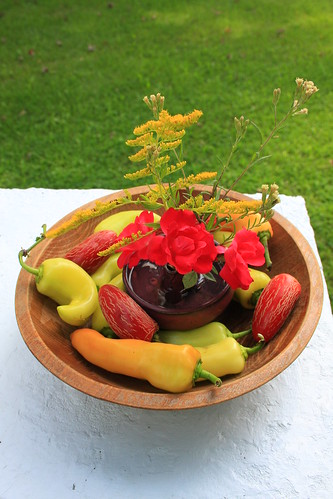
Fresh garden produce in seasonal September arrangement.
(*photo credit)
September 18, 2014 School and the Glory of Good Nutrition
A good beginning meal each day starts everyone off on the right track -- and that applies especially to young people who need a good start to their school day.
A few years ago the Center for Science in the Public Interest rated school nutrition programs and said "Kentucky has the strongest nutrition policy in the land," with a rating of A+. That was at a time when twenty-three states were rated "F." However, in the intervening years other states have scrambled to play catch-up and many have shown improvement. Kentucky can hardly rest on laurels since it has a high ranking on such negatives as obesity, lung cancer, diabetes, and a host of smoker-related ailments. Youth may start well but fall into patterns of adult models; they learn to use tobacco or refrain from proper exercise; they are also subject to the ravages of junk food containing excess empty carbs, sugar, and salt.
When it comes to nutrition education there is always room for improvement since so many of us are subject to a bombardment of false information by the commercial media. Through peer pressure and succumbing to junk foods we can quickly acquire poor nutrition habits. Fewer schools have dispensers of teeth-rotting, empty-calorie soft drinks; and menus for school lunches are becoming more balanced. In fact, these improvements in schools are part of young people's current education, and this is counter to the plague of advertisements on television, radio, billboards, and even the Internet. Nutrition improvement is more than textbook subject matter; lunchroom menus are really part of academic course work.
We cannot think we have permanently improved nutrition. All our nation's schools need constant review of comprehensive food choices in lunch room programs. In many places school cafeterias are offering at least two fruits and/or two non-fried vegetables each day. Youth are becoming acquainted with some good nutrition. Hopefully it is not too late. Some predict a dire condition -- 21st century youth will be less healthy than 20th century young people. However, more than school policy must be addressed; parents and guardians must undergo continued education with the ever changing nutrition research now occurring. Most school children eat only five of twenty-one meals per week in school (and then for only nine or ten months of the year), so some youth are in danger.
Besides spill over of good nutritional practice to homes another advantage is a ready market for small organic farmers and those growing produce for farmer's markets. School districts are starting to insist on buying locally and on higher quality foods that can be controlled by those who want their youth to eat well. Parents can make a vast difference in ensuring good school nutrition policy and here Parent Teacher Associations can contribute much to ensuring improved school nutritional policy.
Prayer: Lord, inspire us to balance our diets and nutrition so
we can better serve you as Earthhealers.

American woodcock, Scolopax minor, carefully hidden.
(*photo credit)
September 19, 2014 Inglorious Campaign Contributions
Profiteers who influence legislators and are lobbyists for wealthy special interests are a perfect focus on Talk like a Pirate Day. A role for citizens to influence governmental bodies for the public interest must not be denied; this is especially true when causes of the poor are at stake that could improve housing, food, and health. Lobbying can be an effective tool for influencing legislation, and the economically powerful know it. But when do deep pockets crowd out public interest influence? The Supreme Count in Citizens United and again this year in the McCutchen decision came down on the side of free speech, no matter how powerful the economic interest and the very wealth of the shouting super-rich.
At stake is the very democratic process in this country. If legislators are beholden to special interests, the fairness of causes will be and are skewed to status quo conclusions before debate begins. This is why a number of progressive groups raised the hue and cry this year for a Constitutional Amendment that would limit the power of money in elections. At this time the number of legislators who have come to the side of restrictions is growing and may become a campaign issue in the next six weeks. Moderate influence is of value; excessive influence is frightening and must be restricted.
Reports over the years show undue influence of the bankrollers and wealth-backed lobbyists getting their way in special appropriations and in tax credits and subsidies. Many regard the slow pace of tax reform to be due to this influence, as well as the failure to control the global financial situation. Over the years we have seen the disgraceful appropriation of military funds to particular districts where the military industrial complex is strongest; we cannot forget unwanted aircraft such as the Boeing air tanker deal which called for the Pentagon to spend $30 billion to lease airplanes it didn't need. Furthermore, Big Energy has been able to slow transition to a renewable energy economy and, in turn, this has potential to do immense harm to our troubled Earth.
Over the years public interest efforts have been undertaken to prohibit lobbyists from either making campaign contributions or raising money for lawmakers; others have sought to implement a comprehensive system of publicly financed campaigns, though this is harder to implement. A Constitutional Amendment would set limits as opposed to instituting a financial system as currently operates in a number of democracies in the world. The existing American scenario of unlimited special interest money results in flooding obscure elections with outside money and buying media space to attack candidates who have limited financial resources. A worst case scenario is that all regular routes to lobbying would be closed, allowing professional "lobbyists" to operate unopposed through junkets, parties, and behind the scene gifts, and citizens would have no recourse. Financial interests must be curbed ASAP.
Prayer: Lord, inspire citizens to take their democracy seriously and to engage in meaningful controls on wealthy special interests.
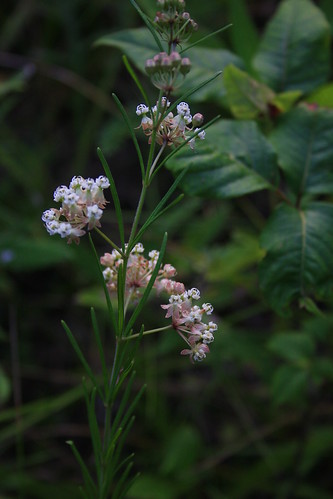
Uncommon sighting, whorled milkweed, Asclepias verticillata.
(*photo credit)
September 20, 2014 There's No Glory in Inequality
The phenomenon of inequality, with CEOs making 400 times more than regular workers, is now being revealed to the horror of the general public. Why is this happening? When taken as averages the distances become all the greater and this has been documented by a number of popular "must read" works such as Capital in the Twenty-First Century by Thomas Piketty (Trans. Arthur Goldhammer); also a must read The Spirit Level: Why Greater Equality Makes Societies Stronger by Richard Wilkinson and Kate Pickett. These and the talks by Senator Elizabeth Warren are making inequality a future political issue. Our Reclaiming the Commons list reasons what this inequality must cease for the good of our citizens, nation, and world:
Gross Unfairness -- Billionaires living next to those who are destitute create an atmosphere of injustice, which cries to heaven for change and revolution. Part of the helplessness related to current regressive taxation is because the governmental apparatus are bought (or stolen) by those in economic power. Lack of justice unsettles our world and opens the door to violent change. Our Constitution and Declaration of Independence, was a product of democratic process, but that is a sham when many lack essentials and a few have excess. Failure to change the system through democratic means leads to destabilizing society and temptation to autocracy.
False security -- Accepting a world of inequality means we are compromising the system and refusing to act according to our civic duty. Those who support the status quo will influence legislation to further enforce the military and police forces needed to secure their practices. Inevitable legitimate disturbances due to eroded liberties can only be suppressed through enhanced surveillance, which is augments by misuse of modern technology. On the other hand, better security comes with equalizing income to a great degree and improving the health and welfare of all on this planet through wealth redistribution. Why rich privilege amid essential need?
Infrastructure deterioration -- When funds that are hoarded by the wealthy (an estimated 30 trillion in tax havens) remain unproductive while roads, bridges, and potential renewable energy systems go unattended leads to community deterioration and lower quality of life by many who are on the poorer end of the spectrum.
It is not right that organizations have within their borders those making enormous excess when the commons are strapped of resources.
Harm to spiritual life -- Jesus says how hard the wealthy have to enter the kingdom; are we wealthy through paid off silence when "benefactors" are not living the Gospel and instead doing the work of false prophets (through prosperity religion) and falsifying the basic spiritual message. This allows the triumph of materialism.
Prayer: Lord, give us the courage to confront the dangers that inequality place on the democratic process and move us to act for the good of our suffering brothers and sisters on this Earth by overcoming the injustice of inequality.
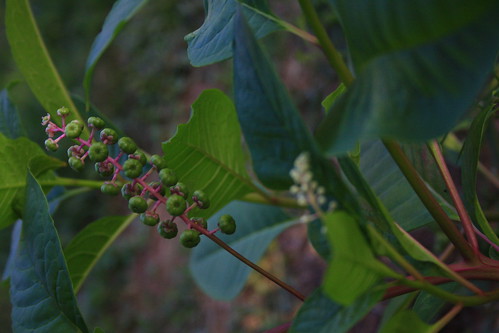
Beginning to ripen: American pokeweed, Phytolacca americana.
(*photo credit)
September 21, 2014 Working Is an Act of Glorification
The last shall be first and the first shall be last. (Matthew 20:16)
This Gospel story is not one of labor relations but one of recognizing the gifts God gives us even while we are undeserving. To be able to work and be productive, no matter for how long or short a time, is exercising a privilege to make the world a better place, and so work opportunity is a gift in itself. We do not deserve long life or certain privileges, though often those who have material privileges think otherwise. We cannot make demands as though we are entitled to a longer life, wealth, or comfort and convenience.
The parable reminds me of the heart-broken minister who lost several close family members in a terrible auto accident; people came up to him at the joint funerals saying that this loving family did not deserve such a tragedy. After working through his grief, the surviving minister finally came to the spiritual insight that he did not deserve his loved ones, for they were God's gifts and were now taken from him, a return of gift to Giver, worthy of gratitude.
Over years, I came to recognize the wisdom of an Appalachian activist and former Asian missionary, Jim Wyker, who offered an insight with this Gospel passage and deserving wages, namely, the laborers were all family people and eagerly awaiting some form of daily work and pay to help with their livelihood. For the unemployed to stand idle all day hoping for work was stressful and a source of concern that actually grew as the day progressed. For them, daily work in the heat of day was far preferable over unemployment and all the stress attached to going back home without enough to meet essential needs. To have stood all day waiting and then be given work was a gift for which they were deeply grateful. The ones who had the privilege to work all day had both the satisfaction of doing something meaningful and a daily wage. They did not deserve more.
In this second view, who is responsible for furnishing jobs? One can argue that the onus is not on the hit and miss policies of a capitalistic system that allows or refuses work opportunities, but ultimately on our nation state. If one has the duty to vote, support or defend our nation, so the nation has the responsibility to see that employment is available to all willing workers who need a livelihood for self and family. Not all people are self-employable. Workers need not be a pool accessible at the whim of a heartless and profiteering economic system. There is plenty of work to be done in this world -- and creative, socially-conscious people can easily list needed activities. There are plenty of resources if fair taxes were obtained from ten million millionaires and over a thousand billionaires (rising by dozens every year). The rich do not deserve to keep their financial goods; these need to be shared with all. In so doing, God's creation is all the more glorified.
Prayer: Lord, give us a sense of fairness so that all might have a deserving quality of life and not extra undeserving privilege.
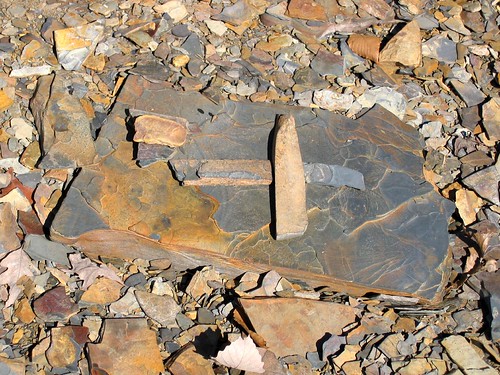
Shale along Cave Run Lake. Rowan Co., KY.
(*photo credit)
September 22, 2014 Breaking Fossil Fuel Addiction Is Glorious
Did you ever stand at the self-serve gas pump and listen to the liquid fuel flow? Were you mesmerized by the clicking sounds from the pump, realizing how it is emptying your pocket of cash while giving you the satisfying odor of gasoline? We become addicts shooting drugs, for the auto is our appendage. President Bush, the younger, was the first to talk about oil addiction, and on this issue he was right. The analogy involves the real -- we "shoot" fuel. But why admit it? Because the very health of our planet depends on whether we will admit our social addiction and take positive steps to become fossil-fuel free. A little over a century ago our great grandparents bought fossil fuels at a drugstore by the quart for kerosene lamps -- a real advance. Seventy years ago a uniformed serviceman cleaned windshields while filling fuel tanks using a hand-pump, with the glass fuel bulb on top with its measured gallon tabs; we youngsters watched it fill with awe, for during those war years gas-rationing rendered this an elaborate occasional ritual.
A Carbon tax or fee could bring us to reality. Fossil fuel economic costs take a heavy chuck of our current four-dollar-a-gallon gasoline budget. Recent natural gas price shrinkage due to newly available fracked fuel sources has given some reprieve for social addicts -- but that is a mirage. Why argue for a tax to break the spell? Mainly because fossil fuels are not only subsidized in America and many parts of the world, but because their use is paid for in part by the global environment itself. A carbon tax or carbon fee (Jim Hansen's more politically acceptable term) makes consumers aware of true costs due to pollution and extra carbon dioxide greenhouse gas that is taking its environmental toll. Goodbye glaciers, polar bears, snow-covered Mount Kilimanjaro, Pacific island nations. You are our addiction's cost. Attention, thousands of military personnel recovering from Gulf War battle wounds, you are our addiction's cost as well. A carbon tax or fee for a wakeup call.
A "Manhattan-type" (1940s atom bomb development project) renewable program is absolutely needed. That is after we turn ourselves to conquering an addiction that profiteers deny exist. Personally we must drive less, walk or bike more, and use more public ground transport (avoid fuel-consuming aircraft), and do a host of other energy-conservation practices -- but for citizens with a duty these are not enough. We must apply pressure to our government leaders to accelerate substitution of green renewable energy (wind, solar, etc.). The "Manhattan" renewable energy program can become a reality by putting minds and hearts to it ASAP and taxes to work. Any civil disobedience (CD) threat to make this occur at once is far different from blowing up pipelines, as have occurred in oil-producing Iraq or Nigeria. The CD pledge that one hundred thousand citizens have made to stop the XL Pipeline is one of citizen duty for the good of our country and planet. But this takes courage.
Prayer: Lord, you are the Higher Power to whom we turn, for our
condition is such that we will not take the necessary steps alone.
Encourage us to advance and solve our fossil fuel problems.
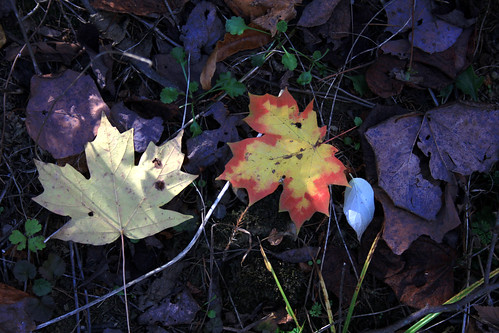
Autumn leaves, freshly fallen.
(*photo credit)
September 23, 2014 Autumn Colors Bring Landscape Glory
Autumn Equinox has come to us and we think ahead to the approaching cooler and somewhat more colorful season. In this time of utter delight we consider the many ways to celebrate -- and hopefully these suggestions might bring others to mind.
* Sightsee. It's America's favorite sport. Some live a distance from more colorful scenes and so seeing the leaves may require a trip worth undertaking if not too far.
* Photograph the scenes that are most memorable. Some like to take a photograph from the exact same spot every month of the year. This makes a grand collage, which becomes a conversation piece.
* Create something new. Draw or paint the scene or at least sit among the colored terrain and jot a small essay or poem. The colors have a way of inspiring since they are here so briefly and yet trigger us to act in creative ways.
* Select leaves, press them, and put them into a binder and encourage others, especially youth in school projects.
* Rake up the colorful autumn leaves as they fall; don't burn them but rather put them into a compost bin to turn into material for mulch in the spring.
* Hike within the colored landscape at least some time this season, for that gives time to let glory seep into your bones.
* Camp, if the opportunity arises -- or at least picnic.
* Encourage those who are burdened with concerns and troubles to just step out and see the colors of the great outdoors. Often people overlook what is near, and the added moment will ease their minds -- and you are the encouraging spark of their enjoyment.
* Send your favorite colored photo (in digital format) to us at <www.earthhealing.info> and we will consider using it for our reflections with full credits. We enjoy colorful scenes for each day of the year -- and we can always use more among the reflections.
* Work with your travel and tourist bureaus to promote colorful scenic locations, and with environmental groups to preserve these from destruction. Providing an ideal scene for viewing is the most valuable "use" of the forest that can be imagined. In 1997, Nature had an article stating that forests provided five trillion dollars annually in benefits, and one is the joy of colorful landscapes in autumn.
Prayer: Thank you, Lord, for eyes to see and to distinguish colors. Some are color-blind and others partly or completely so, and thus our thanks become more sincere through what they lack. Sight
is a glorious gift and September is a time to say thanks again.
Earth Healing was represented at the People's Climate March on Sunday the 21st in New York City by several of us. My grand nieces Anna and Mary Clare Monroe carried the sign "Earth Healing" in a first zone portion of the massive 400,000 person event.
The march inspired us to redouble our efforts to heal our wounded Earth and the girls and other youth present gave us hope that the coming generations will continue this vital struggle. Al Fritsch, S.J.
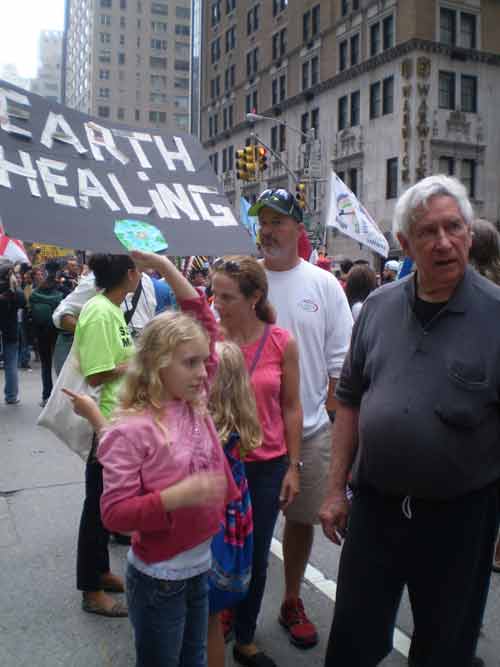
For more photos, visit our Facebook page! Click here!

Native Kentucky sunflower, Helianthus annuus.
(*photo credit)
September 24, 2014 Glory in Christian Unity, Not Uniformity
For full catholicity, every nation, every culture has its own part to play in the universal plan of salvation. Every particular tradition, every local church must remain open and alert to the other churches and traditions ...[otherwise] it would run the risk of becoming impoverished. ("Slavorum Apostoli," n. 27)
This is the year for evangelization in which what we stand for is expressed in the form of spreading Good News. All the while, we seek in this age of modern secularism to afford an opportunity to show unity with believers from various traditions, whether Christian or otherwise. It is easier to direct attention to Christians, who are one community through common baptism in Christ. Thus, the movement is the heart of ecumenism, of knowing others so that in trust and faith we will come back together as one worshiping body.
Uniformity overwhelms cultural diversity. Think back on seeing photos of the ghastly "group think" of a Nazi rally, the true work of the evil one; recall the horror of all clapping for Stalin and the threat that the first to stop risked being shot. To profess our respect for God has become increasingly difficult even amid diverse world cultures. Historically, we know differences occurred early in the rise of Christianity and then between Eastern and Western Christianity, and then through reformation and enlightenment.
Unity in Christ amid diversity remains. Not including difference within the West at this time, let's focus on growing oneness of the East and West. The Eastern Church is divided into four different groups: the Assyrian church of the East ("Nestorian" or the counterpart of Catholic Chaldeans in Iraq); the family of Oriental Orthodox (Armenian, Coptic, Eritrean, Ethiopian, Malankara, and Syrian also called "Monophysite" with Catholic counterparts); the Eastern Orthodox (Greeks, Slavs and some others); and fifteen Eastern Catholic churches, which have counterparts in the above mentioned churches along with Lebanese Maronite Catholics with no counterpart.
The greatest division rests in questions of primacy of leadership and of Christological differences. The first could be possibly lessened by accepting differences in a spirit of mutual collegiality (and the recognized value of oneness when defending against secularism). The second may be solved through prayerful and earnest theological dialog to find what is really meant by the way people perceive their relation to Christ; growing understanding will allow for barriers that seemed insurmountable in the past to be overcome. Just as with Lutheran-Catholic dialog, differences of emphasis could be accepted and balanced. Even the filioque credal difference (the Spirit proceeds from the Father and the Son) between Catholics/Protestants and Orthodox may lead to fuller understanding and resolution. Oneness is a commitment of our common Nicene Creed and so we recall St. John Paul II saying our vocation is to bring into one the various communities of faith. Yes, it can be done.
Prayer: Lord, may we all be one as you so desire.
Fr. Al's interview with Catholic News Service: "An author and environmentalist, Jesuit priest from Kentucky discusses a world economy he says is out of biological sync."

An early autumn bouquet. Pasture returning to native aster.
(*photo credit)
September 25, 2014 Glory Be! Limited Land for Food Production
Problems beset a world expecting another billion people in two decades: increasingly, fertile land in fast-developing China and elsewhere is taken out of food production for roads and urban development by the millions of acres: some of the best American cornlands (perhaps over one-third) is used to grow fuels for gas guzzlers. Several responses need to be made rather quickly so that anticipated drop in cropland yields caused by climate change will not result in spreading global hunger, but hold food production steady.
Promote the Second Green Revolution. This involves use of customized seeds meant to withstand floods or in other cases droughts and still bear reasonable crops. Yield increases will not be as dramatic as during the First green revolution of mid 20th century, but could give sufficient grain increases barring no climatic calamities. "A Bigger Rice Bowl," The Economist, 5/10/14, pp. 21-23.
Reduce consumption of meat. Grains converted through animal use to food products are quite inefficient when compared to growing grain and other crops for direct human consumption. Actually, movement away from meat or heavy meat consumption is starting among a younger progressive generation in our country and other affluent lands, a post-middle class food generation. While grain cropland can feed many adequately, turning a major portion of that grain into livestock feed for meat and animal products allows for more resource intense meals, but not necessarily better nutrition for the total population.
Curb subsidies for alcohol from edible foods. While corn used for ethanol has a residue that is nutritious livestock feed, the basic grain is still used in a wide variety of food products. These rise along with the price of corn and that price rise affects far poorer people than the set depending on ethanol-enriched fuel. The contrast is again one of privilege versus the poor. If we must have ethanol, make it from waste products.
Use crop and other land more efficiently. Much of the land in poorer parts of the world could produce more by standard methods, and storage of harvested crops could be managed so that food wastes will not occur. In comparing land use in 2000 in contrast to 1700 we find that 40% of land is used for crops now; in 1700 only 7% was used for food production. The largest changes recently have occurred in the Amazon (termed by ecologists the "lungs of the planet"); tropic land conversion comes at ecological expense and enhance global warming.
Advancing the awareness of global food needs is a mission for all Earthhealers at this time. People do not "need" to drive wasteful SUVs; people need food. People can conserve and drive solar vehicles fueled by the sun; people need food -- and the United States has traditionally been a major food source. Let's speak out.
Prayer: Lord, give us the strength to see food needs and to inspire all to share radically the limited resources at our disposal.
Help us change both our individual and social practices.

Appreciating the subtle colors of a butterfly.
(*photo credit)
September 26, 2014 An Earthhealer's Hopeful Glory
ATTENTIVE -- to all needs and difficulties.
BRIGHT -- enough to distinguish a friend from a foe.
COOPERATIVE -- with others who wish to heal our wounded Earth.
DILIGENT -- as to resources on hand and how to use them.
ENTHUSIASTIC -- to do the right thing with eagerness.
FRANK -- in dealing with polluters.
GRACIOUS -- for the talents God gives us.
HANDY -- in the use of our technical talents.
INSPIRING -- in creative actions for enlisting assistance.
JUST -- in dealings with those who act unjustly.
KIND -- with those willing to learn even when misguided.
LOYAL -- to whistleblowers who are misunderstood.
MASTERFUL -- in adapting and promoting expert ways to heal.
NATURE-LOVING -- How else could we be at this critical time?
OUTRAGED -- but controlled by wanton damage done by the greedy.
PATIENT -- to those of mixed motivation and social addictions.
QUICK -- to see environmental dangers and publicizing them.
RESOURCE CONSERVATION-CONSCIOUS -- at all times and places.
SIMPLE -- in personal lifestyle in all 99 ways.
TOUGH -- as nails to those who want you to accept their culture.
UNITED -- with all who are friends of our Earth.
VALIANT -- in defeats though promising more battles to come.
WITTY -- enough to see the humor in our past mistakes.
EXPRESSIVE -- through words written and spoken in many ways.
YOUTHFUL-AT-HEART -- no matter what our healer's age.
ZEALOUS -- for goals which seem so utterly impossible.
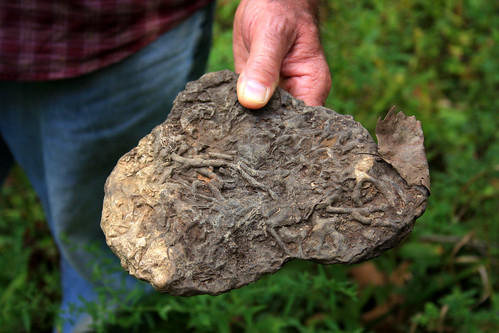
A glimpse into Kentucky's past. Lexington Limestone fossils.
(*photo credit)
September 27, 2014 Choose Good News with a Spice of Glory
News can be depressing: massacres in China, civil war in South Sudan, abductions in Nigeria, and on and on. No wonder so many people resort to fiction, computer games, and other forms of escapism. But how can we stay spiritually realistic and still cope with the blizzard of bad news that bombards us from every side? We need to cultivate interior balance, wherein peace dwells in our heart while we remain alert to world happenings. We are challenged to engage in a troubled world and yet keep from being depressed. Yes, some suggestions for retaining our equilibrium can help:
Offer consolation to others. Jeremiah switched his message from one of warning to that of comfort when the people became uncomfortable due to impending defeat and exile. We need some consoling words, maybe occasional humor, and some upbeat messages about how some are doing good deeds. This takes an extra effort on our part, because we are the ones who create newsworthy events on a personal level. When someone is distracted by bad news, this is a golden opportunity to proclaim Good News to help redirect attention.
Turn off the media for awhile. Though the media may not get the message quickly, it will soon switch the tune if enough people take this advice. This is not escape from life but a temporary furlough. My maternal great grandfather, a French veteran of the terrible Franco-Prussian War, could not stand hearing that the Germans were approaching Paris again at the start of the First World War (at this time a hundred years ago); he abruptly stopped reading newspapers. When the Germans were stalled in northern France, my grandmother learned the Marseillaise and played it, wherein he was encouraged to return to reading the daily newspaper.
Resolve to create good news. It is important for the more evangelistic Christian and others to see that Good News is near at hand, although others fail to see it in a secular world of the bad and the ugly. Make what is happening something good -- areas of human interest can benefit others and spread the word of another's gallant deeds that so often go unnoticed.
Encourage others through recordings. Often the best stories go untold and only after a person is gone do we wish we had recorded deeds worthy of inspiring others. The Folklore Center at the Library of Congress has a Veteran's Project worthy of untold stories. Make sure those of heroic but quiet people are recorded for posterity.
Get away to a consoling place. A change of scenery and occupation may be a basic consoling moment needed by a discouraged person: a walk, a festival, a visit to friends, a short vacation.
Prayer: Lord, you are happy and so we need to imitate this condition, even when it is hard to do so at times. We are to be Easter people believing in the power of the Resurrection that can change world events. Give us the energy that comes from spiritual consolation and help us to extend this to others.

A field of fungi emerges after September rain.
(*photo credit)
September 28, 2014 God's Greater Glory through Hospitality
Welcoming is saying "yes" to people and meaning it, quite different from the Gospel tale of one saying "yes" and not doing it and a second saying "no" and regretting and returning to do something. When we are hospitable we tell strangers in an instant that we say "yes" to them and mean it. The presence of unlocked shrines or churches for the visitor to enter means we have a sense of welcoming that extends beyond a closed local community and embraces others who we do not formally know. The attitude of hospitality is contagious. Many churches are locked today to protect them from vandals. Keeping Churches open is the only specific instruction in Pope Francis' Evangelii Gaudium. Astoundingly, many people find their way back to church through the visits to hallowed grounds, where, in Christ's presence they find solace.
Many church communities like to show hospitality and so welcoming committees see that visitors feel at home -- though some may want to slip in and out unnoticed. A welcoming Church is a sign closer to the Lord and willing to show God's love shining through. The parish areas I serve are in the eco-tourist heart of Kentucky with a half million visitors a year. To welcome tourists with a smile is good business. At Ravenna we have a memorial garden next to our Church with fish pond, memorial bell, shrubs, flowers, and trees along with seating and paths. The welcome sign is for the weary to come and pray. Hospitality thus means opening sanctuaries or some parts of the Church grounds to those wanting to be nearer the Lord. St. Patrick's Cathedral in downtown Manhattan is frequently visited and a perfect model. Open doors may be risky but have value as well. This shows that open arms go out to all the weary.
Hospitality comes in different degrees. Some people and places are warm, others cool -- homes, cemeteries, places of entertainment. The meeting is one of hearts and that comes after years of openness to others. Certainly intrusion and overwhelming need can force people to develop a hardened appearance, but we hope that is temporary. First impressions mean so much and can make people be turned on or off. It is so warm to come and visit before the Blessed Sacrament (the reserved Eucharist contained in a tabernacle near a church altar or in a special room at the church). I testify both to that feeling personally and also to that of others who tell me how they like to visit and pray in sacred worship space.
We are in a time of global and national as well as regional distress, a time when an offering of consolation means so much to weary souls searching for peace. As Jeremiah the prophet shows in such times of national distress, one must turn from words of dire warning and criticism to ones of consolation. Astoundingly, even Stalin had the church doors opened during the lowest moments of the Nazi invasion of Russia -- and he was no paragon of virtue. We need to listen to our hearts telling us to "provide more sacred space."
Prayer: Lord, give us a deepening sense of hospitality so that we can be more like Christ.
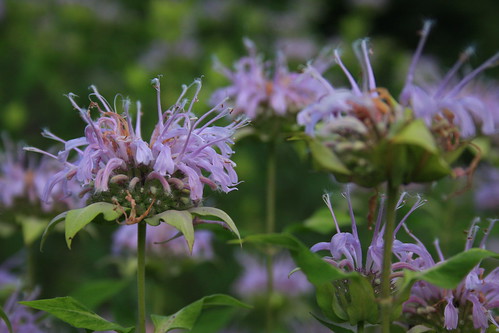
Native Kentucky mint: wild bergamot, Monarda fistulosa.
(*photo credit)
September 29, 2014 Michaelmas and Angelic Glory
Michaelmas is a liturgical/political designation harking back to the Middles Ages along with Christmas, Candlemas, and Lammastide -- and the remembrance of Masses associated with those days. The term refers to popular English portions of the legal year that divided the Courts of England and Wales, with Michaelmas being the first term (followed by Hilary, Easter, and Trinity associated with the respective feasts). English Universities also had terms of which Michaelmas was one.
So much for the full word, but what about the one for whom it is named, the most popular Judeo-Christian angel, Michael. This name means in Hebrew "Who is like God?" Angels have been a neglected subject but they shouldn't be, for we need all the protection against evil spirits that we can get. And evil ones have left their marks on this suffering planet and its privileged ones. Michael, archangelic leader, is a warrior, one who holds the drawn sword in defense of all that is good. Michael conducts warfare with the devil over the body of Moses, and in Revelations he fights the dragon and hurls him into the abyss. Michael is the conqueror, guard, and protector. He is patron of Germany, England, Papua New Guinea, Gibraltar, the Solomon Islands, the sick, radiologists, grocers, mariners, police officers, paratroopers, high places, and cemeteries, probably more groups than any other apart from the Blessed Virgin. His name is popular for both men and women among a wide range of ethnic groups.
Churches have been dedicated to St. Michael since the 4th century A.D., with the most famous being Mont Sant Michel off the Norman coast in France. One of the many Michael churches is in Shonau in the Pfalz region of the Rhineland from which my maternal ancestors came. It is a beautiful village church damaged in the Second World War with bullet marks on the walls. I once attended Sunday Mass on Michael's feastday (with local relatives), imagining my great, great grandparents and their ten sons going to Mass prior to emigrating to American in 1854. They sought protection from Michael, patron of soldiers, even though our family was fleeing the Prussian military service. These and neighboring emigrants built an exact replica of this Church in Ripley, Ohio on the River.
Today, Michael shares the day with the other archangels Gabriel (in Daniel and Luke) and Raphael (in Tobias). The latter was known to have healed the Earth when it was defiled by the sins of the fallen angels (I Enoch 10:7). We need to see that Michael and the others, including our specific guardians, are needed in the battle to heal our wounded Earth. The battle of good and evil is being fought today in our consumer-ridden society, and the outcome may ultimately be secured, but what about the great immediate future? It is the duty of believers with the aid of angelic hosts to confront the powers of evil and today, on Michaelmas Day, is a good time to confirm our commitment to wage war on the forces of destruction.
Prayer: Lord, give us the protection needed to help heal our wounded Earth -- and may St. Michael join in our struggle.
![2968932865_28071e8433_o[1]](https://farm4.staticflickr.com/3863/14945557459_7d702eac53.jpg)
The glory of autumn, as summer plants produce their seeds.
(*photo credit)
September 30, 2014 Fading Glory: The Indian Summer of Life
I really do not celebrate birthdays much for they come way too frequently. In fact, I sort of envy the old folks who cannot remember their birthdays or ages, though they were surely born. One reason to demote the event is that it becomes an occasion to look back to more mobile and faster times as though the past were better. Actually, I thank God for being able to live now three years longer than average white American males today. I add one-third of a second to that expanding life span each year -- what an honor!
Age leaves its marks. My hands tremble, making handwriting illegible though I still type -- thank God. Bruising my right thumb while trimming fruit trees last winter rendered ordinary tasks increasingly difficult. It is rather embarrassing attempting to eat in public for balancing a fork of peas or corn from plate to mouth is nearly impossible. My public food preference is anything that can be glued (mashed potatoes) or speared (Brussels sprouts) or held politely in the hand (a sandwich). Take care in selecting from a menu. Loose rice is a no, no.
Why talk about a tremble? Why not? This is a weakness like many that accompany aging and they could be far worse. I am thankful I am still mobile and mentally alert (though forgetful), and so small handicaps are minor compared to those shut-ins on communion and anointing calls. Need I knock on wood for never spending a night in a hospital? Better is to thank God every day for the gift of good health, and double thanks for the privilege to be able to work in an apostolic ministry. A hand tremble is somewhat controlled by my Doctor's suggestion to give up coffee with its caffeine -- and that I did going cold turkey. The reduced tremble remains a constant reminder that life is short and we do not have complete control of current or future destiny. We are in the hands of God at all times.
Milder forms in gait, appearance, ease of rising, and outlook on life come slipping in like autumn's Indian summer. Yes, this is a glorious season, but it is not lasting -- and that to some degree makes it all the more glorious. Autumn tells us that the summer of activity is drawing to a close and that new forms of activity are now coming into demand. Prayerful demand! Fine, for all things are passing. Let's find this a time to know the seasons of our lives, to live each with a sense of wonder that our eyes can bring. In many ways, youthful insights are left far behind. Some would like to relive their pasts, but far better is always to look ahead to a horizon that is eternal and to the vast needs for the wisdom that we can bring at this time. The freshness of Indian summer gives us pause and well it might. It is a time to poke humor at ourselves for thinking the past moments of glory were so utterly important. And they passed and faded. In fact, the phenomenon of fading is part of the journey of life; it does not mean that all is fading, for the eternal horizon can be the sign of new Indian-summer initiated glory.
Prayer: Thanks, Lord, for opportunities afforded before and emerging now, and let each day be an event of new birth.

Click here for more photos with Fr. Al & Family at The People's Climate March on Sunday the 21st in New York City!
|